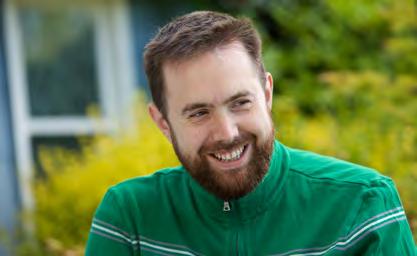RESEARCH MATTERS By Kate Willette
WE’VE BEEN HERE BEFORE Normally, I’d have spent the last few months tracking spinal cord injury research. I’d have done my thing with new peer-reviewed publications, sifting through the jargon with a pen in one hand and a medical thesaurus in the other, multiple laptop tabs open to university and corporate pages. Every time I’ve produced an article for this magazine, it’s been the same process, the same effort to first comprehend and then translate what’s happening in the worldwide effort to repair damaged spinal cords. I write with an imagined “you” in mind — “you” being the person I was when my husband broke his neck more than 19 years ago. In a way, I am always speaking to that confused and anxious version of myself: It will be OK, but not right away. Here’s what you need to know, and here’s what you can safely ignore. Here’s who you can trust. Here’s the truth about this injury and how it will, someday, be healed. Today I find that I’m closer to that 2001 Kate than I’ve been in years, because the pandemic has brought back so much of the emotional and psychological flavor of those days. There isn’t much by way of new research to report right now, especially in the United States. Universities went into lockdown with the rest of us in the spring, and scientists were forced to stop their work and try to come up with ways to
48
NEW MOBILITY
make it safe to continue. Those who were working in clinics, doing trials of new therapies with spinal-cord-injured volunteers, had to call it all to a halt. Call it all to a halt. Does that sound familiar? To me, these six short words concisely describe both the situation inside my husband’s central nervous system and the early months post-injury in our family. Stop whatever you are doing, right now. Cancel all your plans. We need to figure out what this is. Most people reading this will have their own story of that abrupt halt. On March 7, 2001, I had been planning to see a friend launch her new book at a local bookstore. My husband had been planning to take our preteen daughters to their Wednesday night choir practice. Instead the girls and I sat at the trauma center waiting room while doctors worked to stabilize him. Our lives as we’d known them had stopped, but we didn’t know it yet.
The COVID-19 Shut Downs Feel Familiar
The coronavirus has rolled over us all like a slow-motion version of that night, and as the months pass, I keep having an odd sense of déjà vu — the feeling that I’ve been here before. Our home is in Seattle, where the person then thought to be the first in the United States killed by COVID-19 was report-
“I know that careful science is tedious, irritating and necessary.”
ed dead on February 29. Throughout March, April and May, the job was to cancel every plan that involved leaving our apartment. Our lives as we’d known them just stopped, but we didn’t understand it yet. My sense is that we who have come through the sudden and lasting trauma of paralysis entered the pandemic with a tool set others lacked. I’ve been watching the world catch up, slowly. At first there was just disbelief. This happened in China, and then in northern Italy, but it won’t be like that here. Other people break their necks skiing, but not my husband.








